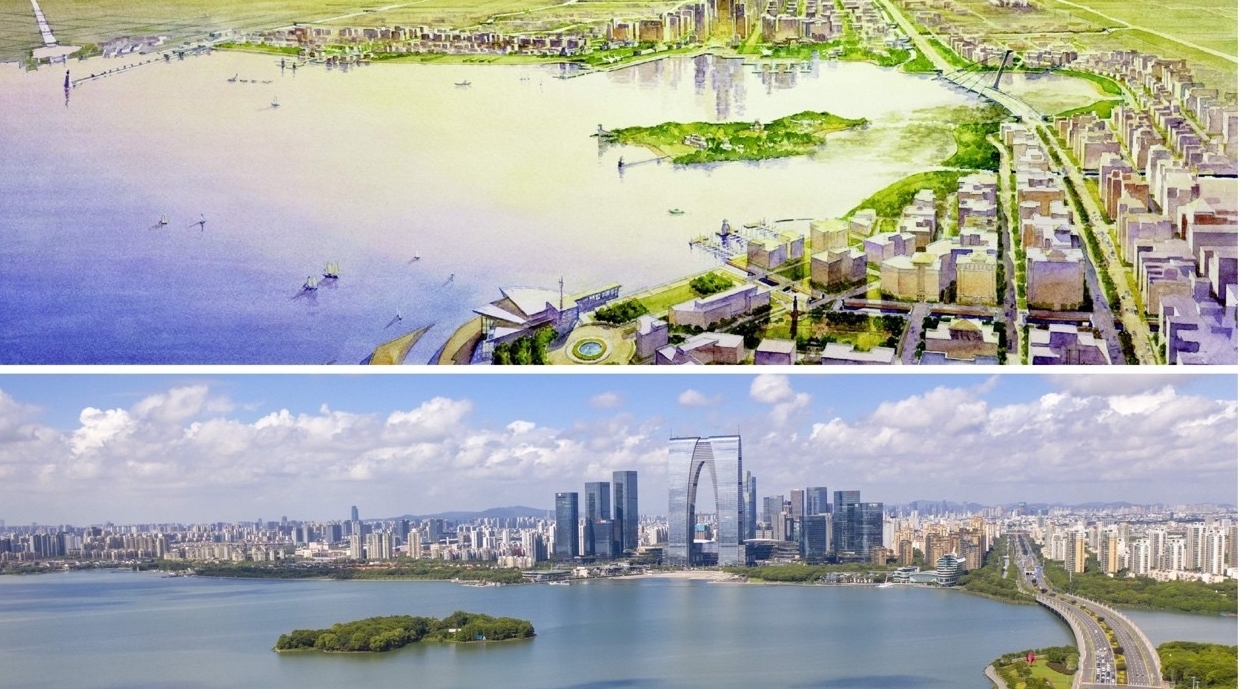More than 30 years ago, Suzhou Industrial Park (SIP) was just a stretch of low-lying paddy fields on the outskirts of Suzhou, eastern China's Jiangsu province. Today, towering skyscrapers and modern infrastructure define the skyline of what has become a fertile ground for innovation and entrepreneurship.

This combo photo shows a blueprint of the Suzhou Industrial Park drawn in 1994 (top) and an aerial view of the industrial park (bottom) in 2024. [Photo provided to China.org.cn]
The transformation began in the spring of 1994, when SIP was launched as the first cooperation project between the Chinese and Singaporean governments, aiming to build a world-class industrial zone.
For three decades, SIP has centered its growth strategy on openness and innovation. In 2024, the park's GDP reached 400.2 billion yuan (US$55.68 billion), making up nearly one sixth of the entire city's GDP. Its R&D intensity reached 5.61% this year, among the highest in China's economic and technological development zones.
"Opening-up and innovation are the park's greatest feature," said Liu Hua, vice chairperson of the Administrative Committee of SIP, during an interview on Wednesday.
Much of SIP's growth has been driven by its efforts of supporting enterprises as the main players in its innovative development. The park channels resources to help them launch businesses, tackle technological challenges, and unlock new creative potential.
So far, SIP is home to more than 10,000 technology companies and over 3,000 national high-tech enterprises. It has also cultivated more than 4,600 small and medium-sized tech firms.
"We provide efficient services and support to companies, achieving win-win results through cooperation," Liu said. She added that SIP has accelerated the development of a modern industrial system centered on artificial intelligence, digital industries, and next-generation information technologies.
AISpeech is one such company that came to SIP to develop conversational artificial intelligence. Yu Kai, the firm's co-founder and chief scientist, said Suzhou was the first national development zone in China to support AI development with dedicated policies.
"Suzhou is very active in attracting investment and boasts strong technological infrastructure," Yu said. Even before he founded AISpeech in 2007, local officials had visited Cambridge University, where he earned his Ph.D. in engineering, to promote investment opportunities.
"I chose to set up my company in SIP because Suzhou offers a solid foundation with its strategic planning, efficient governance, and clear support for technology industry policies," he said.
Today, AISpeech holds 1,597 intellectual property rights and has developed over 70 national and industry standards. Its clients include major automakers and tech firms such as Mercedes-Benz, BYD, Haier, and Xiaomi.
Last year, the Yangtze River Delta Innovation Consortium in Language Computing, led by AISpeech, was selected as one of the first 12 Yangtze River Delta innovation consortiums.
"Through this consortium, companies and institutions work together to accelerate breakthroughs in key technologies and applications," Yu said. "It will play a key role in advancing the development and application of language intelligence technologies in China."


 Share:
Share: 




 京公網安備 11010802027341號
京公網安備 11010802027341號 主站蜘蛛池模板:
日日橹狠狠爱欧美超碰|
亚洲自国产拍揄拍|
五月天婷婷免费视频|
色一情一乱一伦一区二区三区|
日韩不卡在线播放|
免费观看我爱你电影|
日本黄网站动漫视频免费|
性做久久久久免费观看|
亚洲乱亚洲乱少妇无码|
精品国产黑色丝袜高跟鞋|
国产精品乱子乱XXXX|
两根大肉大捧一进一出好爽视频|
欧美另类杂交a|
动漫h肉yin文|
国产在视频线精品视频2021|
孩交精品xxxx视频视频|
九月婷婷人人澡人人添人人爽
|
国产麻豆天美果冻无码视频|
久久丫精品久久丫|
欧美性色欧美a在线播放|
啊快捣烂了啦h男男开荤粗漫画|
中文在线天堂网|
好男人资源在线观看好|
久久精品成人国产午夜|
欧美重口另类在线播放二区|
四虎永久在线观看免费网站网址|
bt天堂在线最新版在线|
好男人好资源在线影视官网
|
国产一卡2卡3卡四卡高清|
**俄罗斯毛片免费|
好男人资源在线观看高清社区|
中国猛少妇色XXXXX|
最新国产精品拍自在线播放|
亚洲高清偷拍一区二区三区|
短篇丝袜乱系列集合嘉嘉|
国产亚洲男人的天堂在线观看|
1000又爽又黄禁片在线久
|
国产精品亚洲欧美大片在线观看|
4ayy私人影院|
小兔子救了蛇被蛇两根进去
|
精品伊人久久久|
主站蜘蛛池模板:
日日橹狠狠爱欧美超碰|
亚洲自国产拍揄拍|
五月天婷婷免费视频|
色一情一乱一伦一区二区三区|
日韩不卡在线播放|
免费观看我爱你电影|
日本黄网站动漫视频免费|
性做久久久久免费观看|
亚洲乱亚洲乱少妇无码|
精品国产黑色丝袜高跟鞋|
国产精品乱子乱XXXX|
两根大肉大捧一进一出好爽视频|
欧美另类杂交a|
动漫h肉yin文|
国产在视频线精品视频2021|
孩交精品xxxx视频视频|
九月婷婷人人澡人人添人人爽
|
国产麻豆天美果冻无码视频|
久久丫精品久久丫|
欧美性色欧美a在线播放|
啊快捣烂了啦h男男开荤粗漫画|
中文在线天堂网|
好男人资源在线观看好|
久久精品成人国产午夜|
欧美重口另类在线播放二区|
四虎永久在线观看免费网站网址|
bt天堂在线最新版在线|
好男人好资源在线影视官网
|
国产一卡2卡3卡四卡高清|
**俄罗斯毛片免费|
好男人资源在线观看高清社区|
中国猛少妇色XXXXX|
最新国产精品拍自在线播放|
亚洲高清偷拍一区二区三区|
短篇丝袜乱系列集合嘉嘉|
国产亚洲男人的天堂在线观看|
1000又爽又黄禁片在线久
|
国产精品亚洲欧美大片在线观看|
4ayy私人影院|
小兔子救了蛇被蛇两根进去
|
精品伊人久久久|